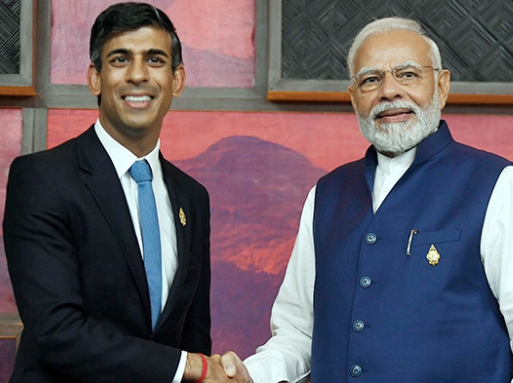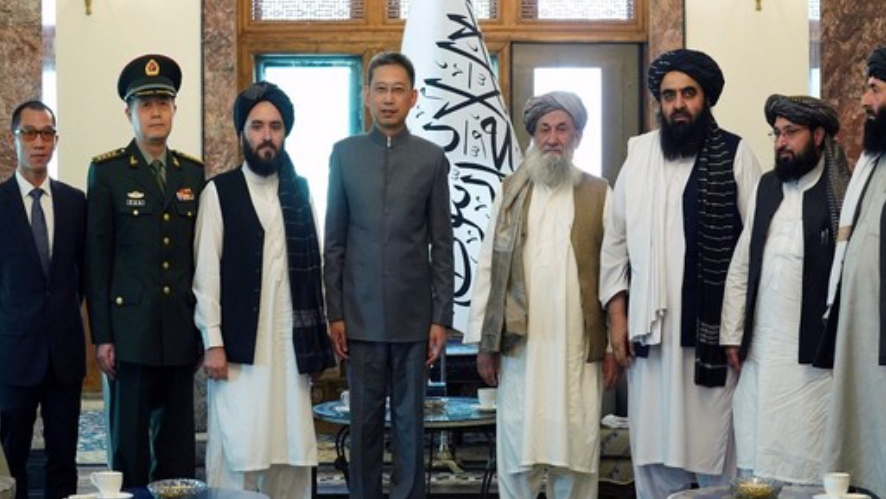Still no light at the end of the India-UK FTA tunnel
- SIS Blog

- Nov 18, 2023
- 4 min read

By Prof. (Dr.) Gulshan Sachdeva
It remains unclear whether India and the UK will be able to conclude a trade deal during Rishi Sunak's upcoming visit to India.
External Affairs Minister S Jaishankar's recent visit to the United Kingdom became more interesting with the abrupt reshuffling of the British Cabinet that occurred while he was in London. Initially, he engaged with British Foreign Secretary James Cleverly during the reception hosted by the Indian High Commissioner.
The following day, he became the first foreign leader to hold a meeting with the newly-appointed Foreign Secretary, former British Prime Minister David Cameron. He once again encountered Cleverly, who had assumed the role of Home Secretary, succeeding Indian-origin Suella Braverman. In fact, during the visit, he met three British Prime Ministers — Rishi Sunak, Tony Blair, and Cameron. His trip primarily aimed to lay the groundwork for Sunak's upcoming visit to India.
Despite constant shifts in British political dynamics and sporadic activities of radical Sikhs in the United Kingdom, New Delhi’s ties with London continue to witness an upward trajectory.
Somehow, Britain’s post-Brexit ambitions have coincided with India’s economic and strategic priorities.
These ambitions and priorities are captured through the upgraded Comprehensive Strategic Partnership and Roadmap 2030. The roadmap covers a broad spectrum of issues spanning trade, defence and security, as well as people-to-people connections. Official statements indicate that apart from bilateral issues, Jaishankar discussed broader issues concerning the war in Ukraine, the situation in Israel and Gaza, as well as the Indo-Pacific region.
In addition to the overall positive trend in bilateral relations, two specific issues are being closely monitored. First, developments at the bilateral trade negotiations. Second, convergence of issues and possible co-operation in the Indo-Pacific region, particularly after the British tilt towards the region.
The India-UK Enhanced Trade Partnership (ETP) was launched in early 2021 and formal trade negotiations began in 2022. During Prime Minister Boris Johnson's visit to India in April 2022, a deadline for reaching an agreement was set by Diwali of 2022. Even this Diwali has gone. Following 14 rounds of negotiations, five out of the 26 chapters remain unresolved. In fact, critical matters related to intellectual property rights, rules of origin, financial services, work visas, and specific item tariff reductions still require resolution.
While bilateral talks commenced only last year, negotiations for a trade deal have been ongoing since 2007, initially within the framework of India-EU discussions. So difficult issues concerning short term mobility for high skilled professionals, investment protection, Indian market access to British legal and financial firms, high Indian tariffs on scotch whiskey and automobiles, non-tariff barriers on some Indian exports etc. have been known for years.
During the visit, Jaishankar asserted that both are hoping to find “a landing point” for the FTA that works for both the countries. Braverman may be out of Sunak’s Cabinet, but anti-immigrant rhetoric in British politics will continue. So, it will not be easy for Sunak to link bilateral FTA with some kind of deal on mobility.
Many reports suggest that as part of the trade deal, India is now not seeking an increase in student or other visas. Instead, the focus is on facilitating easier intra-company transfers and providing portable pensions for those who contribute in the UK. Even linking these intra-company transfers with the FTA may not be easy.

Having refrained from signing any trade deals for years, New Delhi is currently working to alter its image as a hesitant trade partner. After two major trade deals with Australia and the United Arab Emirates, achieving an FTA with the UK could represent a crucial milestone.
The last two agreements allow deep access into the partner country’s market, safeguards in case of import surges, and better rules of origin. India is likely to follow a similar strategy not only with the UK but also with the European Union and the Gulf Cooperation Council. This could pose some new challenges to negotiators.
Evolving geopolitical shifts, including the rise of assertive China and closer India-US ties have played an important role in bringing India and the UK together. Still convergence on many foreign policy issues will not happen automatically. On Ukraine, Indian and British perceptions differ. The Israel-Palestine issue is still evolving. Discussions surrounding the Indo-Pacific are currently addressing matters related to maritime security, infrastructure connectivity, and triangular development cooperation.
As a Prime Minister for six years, Cameron played a pivotal role in shaping a ‘golden era’ of relations with China. He is now a heavyweight in-charge of the British foreign office. His appointment has already been hailed in the Chinese media. Though as foreign secretary, he faces an entirely different geopolitical environment, his impact on British foreign policy will be visible soon. He has also been very enthusiastic about relations with India. However, the pivotal issue remains unclear as to whether India and the UK will be able to finalise a trade deal during Sunak's upcoming visit to India.
Originally Published : The Deccan Herald, 16th November' 2023
Posted on SIS Blog with the Authorisation of the Author
Prof. (Dr.) Gulshan Sachdeva is a Professor, at the Centre for European Studies and Coordinator, at the Jean Monnet Centre of Excellence, at Jawaharlal Nehru University, New Delhi, India.




